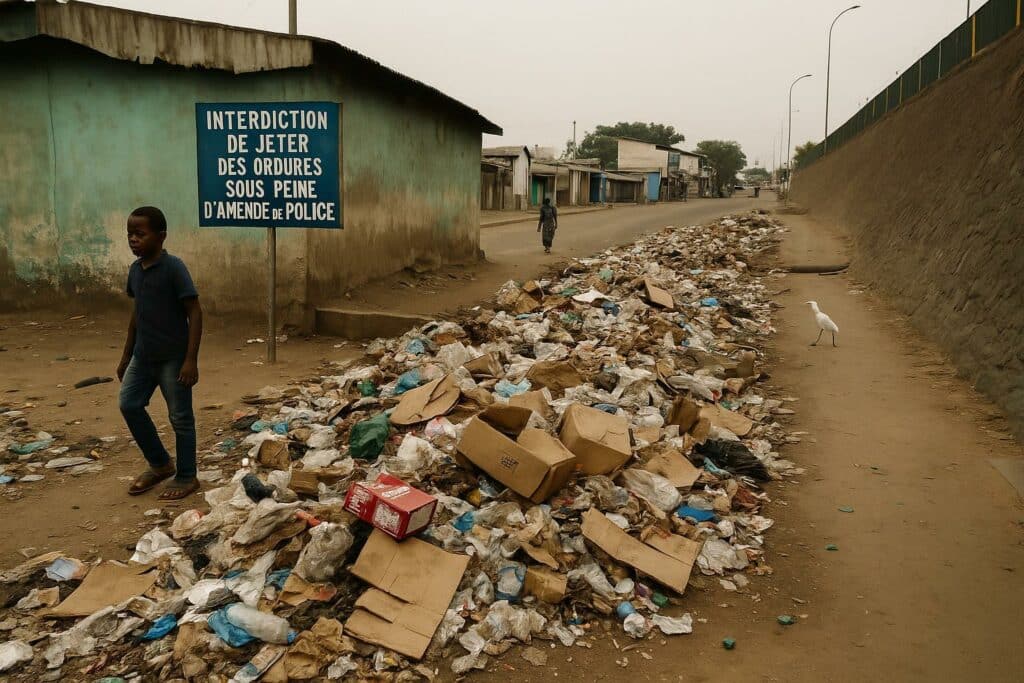Overflowing bins test Brazzaville’s resilience
In the dense October heat the Congolese capital is holding its breath. Around the metallic skips that punctuate the freshly asphalted avenues, mounds of household refuse have risen day after day, sending acrid smells across Makélékélé, Moungali or Talangaï. Residents advance in zigzags to avoid leachate pools while storm drains, already narrow, are clogged by plastic bags carried by the first rains. The spectacle, reminiscent of previous crises, resurfaces as the personnel of Albayrak, the Turkish company entrusted with municipal collection, pursue a labour dispute that has paralysed their fleet of compactors.
Health professionals quietly warn of an uptick in water-borne diseases whenever the rainy season meets such conditions, and environmental officers concede, off record, that the current accumulation is among the most serious since 2019. “We are racing against vectors of cholera and malaria,” a senior official in the Directorate-General of Sanitation admits, requesting anonymity. His chief, Yvon Kaba, has multiplied site visits and public appeals in recent days, but the tonnage keeps growing.
A policy blueprint under immediate stress
Ironically, the surge comes only weeks after the Minister of Urban Sanitation, Local Development and Road Maintenance, Juste Désiré Mondélé, secured cabinet endorsement for the National Sanitation Policy (PNA) 2026-2030. Presented on 14 October during a Brazzaville workshop, the document outlines four cardinal objectives: curbing diseases linked to poor hygiene, shielding ecosystems from climate shocks, nurturing a circular economy around recycling and spawning green jobs for youth. The timing underscores both the foresight and the difficulty of policy implementation. “A strategy gains legitimacy when the streets mirror its ambitions,” an urban planner at Marien-Ngouabi University observes. “Today the mirror is cracked, but not broken.”
The delicate arithmetic of cleanliness
At the core of the dilemma lies financing. Official records show that the current public-private contract for Brazzaville and Pointe-Noire costs 3.25 billion CFA francs per month. The figure, negotiated before the sharp oil-price decline of 2014 and the subsequent public-debt consolidation, now weighs heavily on the Treasury. Attempts to supplement the envelope through a monthly levy of 2 000 CFA francs on civil-service salaries have not bridged the gap. As a senior budget officer concedes, “The fiscal room is narrower than the gutters we are trying to unclog.”
Yet authorities are wary of jeopardising investor confidence by unilaterally revising the arrangement. Conversations among deputies on the Finance Committee suggest a preference for pragmatic cost-sharing rather than abrupt rupture. In the meantime the strike has revived calls for complementary, home-grown mechanisms that would cost a fraction of the current outlay.
Grass-roots avenues for immediate relief
Several arrondissement mayors, mindful of local frustration, are lobbying for a contingency scheme relying on neighbourhood labour brigades and municipal trucks, financed between 10 and 20 million CFA francs per district each month. With nine arrondissements in Brazzaville and six in Pointe-Noire, the aggregate bill would remain well below the billion-franc mark. Proponents argue that such an approach would dovetail with the PNA’s job-creation pillar and could be underwritten, at least temporarily, by the existing salary levy. Critics retort that technical standards, occupational safety and final disposal sites must be guaranteed if the initiative is to avoid mere displacement of waste from one street to another.
Yvon Kaba maintains that his department “stands ready to coordinate logistical support, provide protective equipment and monitor environmental compliance,” provided legal authorisation is swiftly clarified. For now, informal youth groups have begun loading pickup trucks with mixed waste, a gesture less symbolic than it appears: every tonne removed breaks the chain of contamination that threatens public health.
Le point juridique/éco: re-examining public-private models
The present impasse rekindles an old debate on the contractual architecture governing urban services. Congolese law allows for performance-based concessions, but monitoring clauses often remain under-specified, creating grey zones when strikes or force-majeure events arise. Fiscal lawyers suggest inserting adaptive tariff formulas that could ease pressure during commodity shocks while preserving operator solvency.
Economists, for their part, emphasise the opportunity cost of continued high-value contracts amid tightening budgets. Redirecting part of the savings toward recycling infrastructure could reduce landfill volumes and generate revenue streams from compost or plastics, aligning practice with the circular-economy ambitions of the PNA.
À retenir: health, climate and credibility at stake
The garbage that now mars the boulevards of Brazzaville is more than an eyesore. It is a barometer of institutional coordination, fiscal prudence and environmental stewardship. The PNA offers a comprehensive roadmap, yet its credibility will depend on the capacity of all stakeholders—state, municipalities, private operators and citizens—to translate blueprints into pavements cleared and waterways unblocked. In that endeavour, time is as unforgiving as the tropical sun on decomposing waste.

